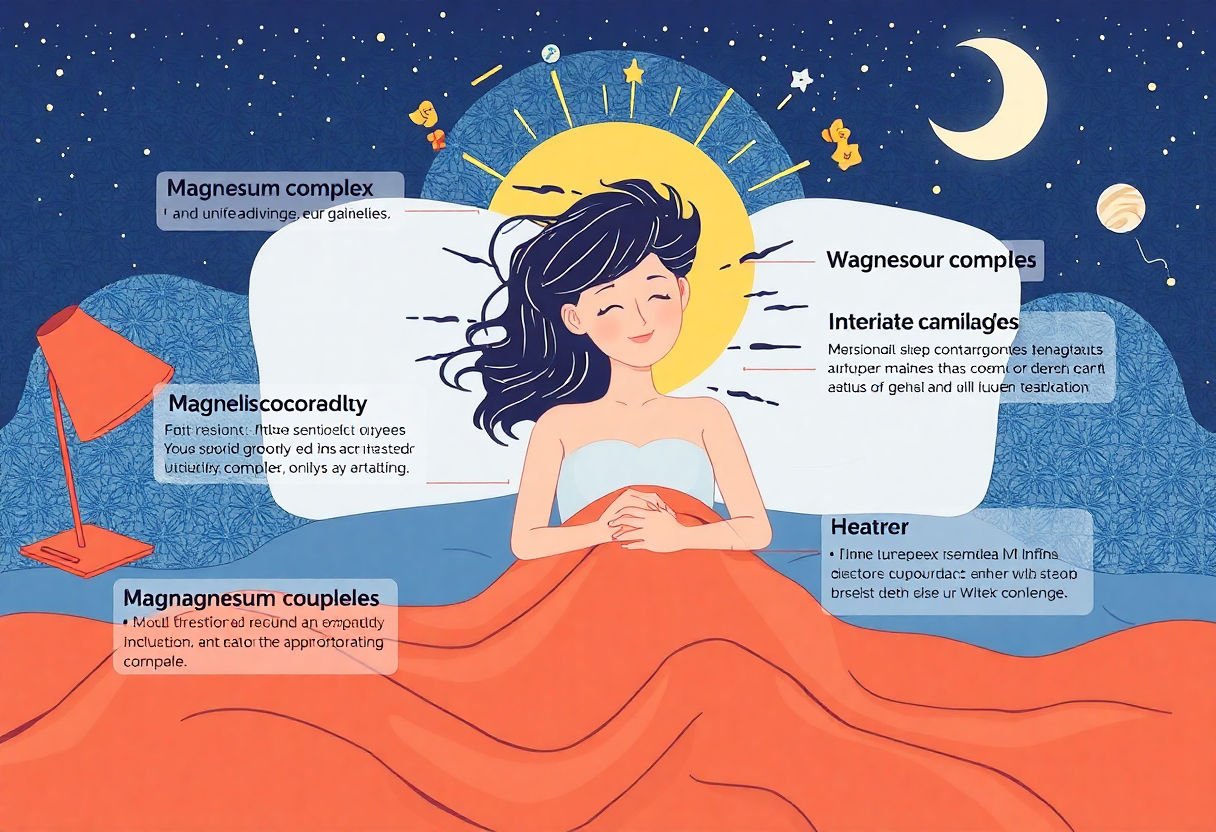Discover the potential benefits of magnesium complex supplements in enhancing sleep quality and supporting overall health. This article delves into the importance of magnesium for sleep health, exploring its mechanisms and recommended dosages for achieving optimal rest. Learn how to choose the right supplement tailored to your needs, while also understanding potential side effects and considerations. Join us as we explore real-life experiences of individuals who have improved their sleep patterns through magnesium complexes and offer insights into how it can complement other sleep aids. Enhance your sleep journey with informed choices and insights.
Key Takeaways
- Magnesium complex supplements are essential for enhancing sleep quality by promoting relaxation and reducing insomnia symptoms.
- Understanding the appropriate dosages is crucial, as individual needs may vary, impacting the effectiveness of the supplement.
- Selection of high-quality magnesium complex supplements involves choosing products with bioavailable forms for optimal absorption.
- While generally safe, it is important to consider potential side effects and consult healthcare providers, especially for those with existing health conditions.
- Combining magnesium with other natural sleep aids can further enhance sleep quality, providing a holistic approach to better rest.
What is Magnesium Complex?
Magnesium Complex supplements are specially formulated to enhance the bioavailability and efficacy of magnesium intake, crucial for various bodily functions, including promoting better sleep. These supplements are a blend of different magnesium compounds, each contributing unique benefits to support bodily processes.
A Magnesium Complex typically includes multiple forms of magnesium, such as Magnesium Citrate, Magnesium Glycinate, and Magnesium Oxide. This diverse composition ensures optimal absorption. Magnesium Citrate is known for its ability to improve bowel movements, thus aiding digestive health, while Magnesium Glycinate is renowned for its high absorbability and calming effects on the body, which can be especially beneficial for individuals struggling with sleep issues.
The presence of Magnesium Oxide in these complexes provides a balance by compensating for any deficiencies efficiently and contributing to overall bone health. Some advanced Magnesium Complex formulations may also include trace minerals or vitamins, such as Vitamin B6, to further bolster the body’s ability to utilize magnesium effectively.
Magnesium complexes are formulated to maximize the mineral’s uptake and minimize potential gastrointestinal discomfort that might occur with singular magnesium compounds. This well-rounded approach not only supports sleep health but also benefits muscle relaxation, energy production, and nervous system function.
In conclusion, Magnesium Complex supplements provide a comprehensive solution for those looking to harness the various physiological benefits of magnesium, especially in improving sleep quality. By combining different magnesium salts, these complexes offer a multifaceted approach that addresses both the quantity and quality of magnesium absorption.
The Role of Magnesium in Sleep

Magnesium plays a crucial role in promoting healthy and restorative sleep. This essential mineral is known for its ability to modulate various neurotransmitter systems, which are fundamental to maintaining sleep integrity and quality. By influencing the regulation of melatonin—a hormone responsible for sleep-wake cycles—magnesium facilitates better sleep onset and duration.
Magnesium is involved in maintaining nerve function and reducing the stimulation of the nervous system, thus encouraging relaxation before bedtime. It acts as a natural calmative, reducing anxiety levels by regulating the release of cortisol, a stress hormone that might hinder sleep if elevated. Individuals experiencing magnesium deficiency are more susceptible to insomnia, as their bodies struggle to maintain this balance.
Furthermore, magnesium’s role in muscle regulation enhances the relaxation of muscles, potentially reducing issues such as restless leg syndrome, which can disrupt restful sleep. This is particularly beneficial for individuals suffering from muscle cramps or those who have high physical activity levels.
In addition to its numerous direct benefits for enhancing sleep quality, magnesium also supports indirect aspects of sleep health. It contributes to regulating blood pressure and improving digestion, two factors that when imbalanced, can negatively affect one’s ability to attain a restful night’s sleep.
For those seeking to improve their sleep quality, incorporating magnesium complex supplements into their routine could prove to be an effective and natural solution, helping to establish a more consistent and restorative sleep pattern.
Benefits of Magnesium Complex for Better Sleep

Magnesium complex supplements offer a range of benefits that significantly improve sleep quality, particularly for those struggling with insomnia or restless sleep. Magnesium is vital in regulating neurotransmitters that calm the nervous system, thereby promoting relaxation and preparing the body for rest.
Several studies have shown that magnesium deficiencies can lead to sleep disturbances and increased sleep latency. By addressing this deficiency, magnesium complexes help in achieving a more restorative sleep cycle. The ability of magnesium to increase gamma-aminobutyric acid (GABA) levels in the brain is pivotal since GABA is a neurotransmitter that stimulates relaxation and encourages sleep. Enhanced GABA activity reduces feelings of anxiety and stress, both of which are significant barriers to quality sleep.
Moreover, magnesium has anti-inflammatory properties, which can mitigate discomfort and pain that might otherwise disturb sleep. For those suffering from conditions such as restless leg syndrome or periodic limb movement during sleep, magnesium can provide relief by supporting muscle relaxation.
Anecdotal evidence often highlights the calming effect of magnesium complexes, with many users reporting a reduction in nighttime awakenings and an improvement in sleep continuity.
While benefits are substantial, it is essential to monitor intake, as excessive magnesium can lead to digestive issues. However, for most individuals, incorporating a magnesium complex supplement can be a valuable addition to a nightly routine, paving the way to achieving uninterrupted and peaceful sleep.
Recommended Dosage for Sleep Improvement
For individuals seeking to improve sleep with magnesium complex supplements, determining the appropriate dosage is crucial. The recommended daily intake for magnesium varies based on several factors, including age, sex, and specific health conditions.
Generally, for adults, a dose ranging from 200 mg to 400 mg per day is widely suggested to support sleep enhancement. However, the actual necessary dose may differ based on dietary magnesium intake, as well as individual physical and metabolic needs.
It is advisable to start with a lower dosage, such as 200 mg, and gradually increase it as needed, while monitoring the body’s response. Conducting this gradual increase allows the body to adapt and helps in identifying the precise dosage that yields the best results in terms of sleep quality.
Consultation with a healthcare provider is strongly recommended before initiating supplementation, especially for people with existing health conditions or those who are pregnant or breastfeeding. Healthcare professionals can provide personalized advice and ensure that magnesium does not interact with any medications being taken.
Additionally, timing is an essential consideration for optimizing the sleep benefits of magnesium supplements. Taking magnesium complex supplements about 30 minutes to an hour before bedtime is generally effective, as it aligns the supplement’s relaxing properties with the body’s natural circadian rhythms.
Monitoring the body’s response to supplementation and adjusting the dosage accordingly can significantly impact one’s overall sleep improvement, leading to enhanced relaxation and restful nights.
Choosing the Right Magnesium Complex Supplement
When selecting a magnesium complex supplement for enhancing sleep, several factors must be considered to ensure maximum effectiveness and safety. First and foremost, identify the specific forms of magnesium included, as different compounds such as magnesium glycinate, citrate, or malate have varied absorption rates and effects on the body. Magnesium glycinate is particularly favored for sleep due to its calming properties.
Additionally, pay attention to the purity and quality of the supplement. Choose products that are labeled free from fillers, artificial additives, and allergens. Opt for brands that adhere to Good Manufacturing Practices (GMP) to ensure high standards of production.
Consider the recommended dosage and formulation. Some supplements combine magnesium with other sleep-enhancing ingredients such as melatonin or valerian root, which may offer synergistic benefits. However, it’s crucial to ensure these combinations align with your individual health needs and do not interfere with existing medications.
Bioavailability is another critical factor. Supplements with higher bioavailability are absorbed more efficiently by the body, providing enhanced benefits. Magnesium citrate and glycinate are known for their excellent absorption rates.
Finally, evaluate the manufacturer’s reputation and customer reviews. Brands with positive testimonials and a history of reliability are often better choices. Reading reviews can provide insights into others’ experiences and effectiveness, helping guide your decision.
By carefully considering these factors, you can select a magnesium complex supplement that supports improved sleep quality while aligning with your personal health needs.
Possible Side Effects and Considerations

When considering magnesium complex supplements for sleep improvement, it’s important to be aware of possible side effects and various factors to ensure a safe experience. While magnesium is generally well-tolerated, excessive intake can lead to several adverse effects:
- Digestive Issues: High doses of magnesium can cause gastrointestinal discomfort, including diarrhea, nausea, and cramping. It’s advisable to start with a lower dosage and gradually increase as tolerated.
- Lower Blood Pressure: Magnesium’s ability to relax muscles can result in lower blood pressure, which might be a concern for individuals with existing hypotension or those on medication for hypertension.
- Electrolyte Imbalance: Prolonged use of high-dose magnesium supplements without professional guidance can disrupt electrolyte balance, particularly affecting calcium levels.
Considerations Before Taking Magnesium Complex Supplements:
- Consult With a Healthcare Provider: Before beginning any supplement, especially if you have underlying health conditions or are taking medication, it is crucial to consult a healthcare professional.
- Pregnancy and Breastfeeding: While magnesium is essential during pregnancy and breastfeeding, the appropriate dosage should be determined in consultation with a healthcare provider.
- Individual Needs and Response: Supplementation should be tailored to individual needs, as magnesium requirements can vary based on diet, age, and health status.
Understanding these potential side effects and considerations allows you to make informed decisions about incorporating magnesium complex supplements into your routine for better sleep and overall well-being. Adjustments in dosage or product choice might be necessary based on personal health conditions or dietary habits.
Combining Magnesium with Other Sleep Aids

Magnesium is often viewed as a formidable ally in the quest for better sleep, but its effectiveness can be amplified when combined with other sleep aids. Several natural and herbal supplements can work synergistically with magnesium to enhance sleep quality:
-
Melatonin: Known as the sleep hormone, melatonin is essential for regulating the sleep-wake cycle. Combining magnesium with melatonin can provide a powerful one-two punch for initiating and maintaining deep, restful sleep. Magnesium prepares your body for relaxation, while melatonin signals your brain that it is time to wind down.
-
Valerian Root: This herbal remedy has long been utilized for its calming effects. When paired with magnesium, valerian root can help reduce anxiety and stress, two common sleep disruptors. This combination can support a state of relaxation conducive to falling asleep more easily.
-
Lavender: Recognized for its soothing aroma, lavender is often used in aromatherapy to promote relaxation. Oral supplements or essential oils used alongside magnesium can further imbue your environment with tranquility and calm, needed for a good night’s sleep.
-
Chamomile: Renowned for its gentle sedative properties, chamomile tea or supplements combined with magnesium can help settle a racing mind and prepare the body for rest. This duo is particularly effective for those who struggle with insomnia due to overactive thoughts.
Incorporating magnesium with these other sleep-inducing agents can enhance each element’s effects and present a holistic approach to improving sleep quality. It’s advisable to consult with a healthcare provider before starting any new supplement regimen to ensure safety and effectiveness.
Real-life Experiences and Testimonials

Incorporating magnesium complex supplements has reportedly transformed sleep experiences for countless individuals, allowing for deeper and more restful nights. Stories abound of individuals who battled with insomnia and disrupted sleep patterns for years before discovering the benefits of magnesium. A tech executive from California shared how her nightly routine now includes magnesium complex, leading to a significant improvement in her ability to fall asleep within minutes, compared to nearly an hour previously.
Numerous fitness enthusiasts also highlight magnesium’s role in promoting recovery and relaxation. A marathon runner recounted his pre-race anxiety and subsequent sleepless nights until he began using magnesium supplements. “It’s like a switch was flipped,” he said. “The tension and stress melted away, and I could finally get the restorative sleep I needed.”
For others, magnesium has provided relief from restless leg syndrome, which frequently interrupted sleep. One user described her experience: “After starting on magnesium complex, the constant urge to move my legs vanished, and I could enjoy a full night’s sleep.”
These testimonials affirm the potential of magnesium complex supplements to enhance sleep quality. While individual experiences vary, a common thread remains: the journey towards improved sleep is often profoundly affected by integrating magnesium into one’s nightly regimen. Importantly, these experiences underscore the importance of consulting with a healthcare professional to tailor magnesium intake appropriately, ensuring both safety and efficacy in personal health management.
Conclusion
Magnesium complex supplements play a crucial role in fostering better sleep by aiding relaxation and promoting sleep health. As examined, these supplements offer a natural solution for those seeking to enhance their sleep quality. The discussed experiences and recommendations indicate significant benefits with appropriate usage. As research and consumer testimonials continue to support these findings, the integration of magnesium supplements could become a steadfast component of holistic sleep improvement strategies. For those considering this supplement, it is wise to begin with the recommended dosages and pay heed to potential side effects for optimal results.
Frequently Asked Questions
What is the best time to take magnesium complex supplements for better sleep?
Taking magnesium complex supplements shortly before bedtime is typically recommended, as this allows its soothing effects to aid in relaxation and promote restful sleep.
Can magnesium complex supplements cause any side effects related to sleep?
While magnesium supplements are generally safe for most individuals, some may experience mild side effects such as digestive discomfort. It’s important to follow recommended dosages and consult a healthcare provider if any adverse symptoms arise.
Are there specific types of magnesium that are more effective for improving sleep?
Magnesium glycinate and magnesium citrate are often considered more effective for sleep improvement due to their high absorption rates and calming properties, making them a popular choice in magnesium complex supplements.
How long does it typically take to notice improvements in sleep with magnesium complex supplementation?
Improvements in sleep quality can be observed within a few days to weeks of consistent magnesium complex supplement use, depending on individual health conditions and sleep issues.
Is magnesium complex supplementation suitable for everyone looking to improve their sleep?
Most individuals can benefit from magnesium supplementation, but it may not be suitable for those with specific medical conditions or dietary restrictions. Consulting with a healthcare professional is advised before starting any supplement regimen.
